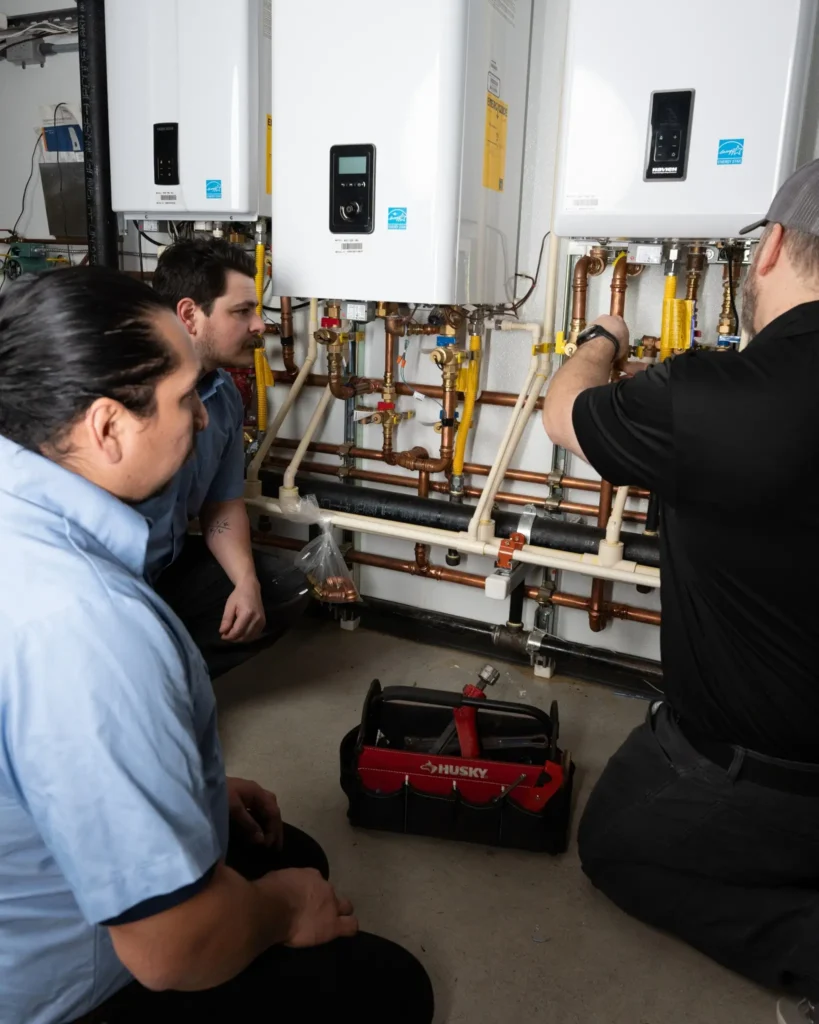Ever had that rude awakening when your morning shower suddenly turns ice cold? Or maybe you’ve noticed your tankless water heater making sounds that belong in a haunted house? Yeah, these aren’t just minor inconveniences – they’re your water heater’s way of waving red flags.
While tankless water heaters are the leaders of energy efficiency and endless hot water, even these modern marvels need some TLC to keep performing their best. Just like any hardworking appliance in your home, they can develop issues over time that’ll have you questioning all your life choices during that freezing shower.
But don’t worry! Before you start heating water over a campfire, let’s dive into the telltale signs that your tankless water heater is crying out for professional attention. Understanding these warning signals could save you from a complete system breakdown and keep those hot showers flowing smoothly.

Inconsistent or No Hot Water
Picture this – you’re half asleep, stumbling into the shower, and BAM! Ice-cold water hits you like a polar plunge. If your tankless water heater is pulling these kinds of stunts, leaving you with lukewarm dribbles or flat-out cold water, it’s not just being difficult. It’s waving a big ol’ red flag.
I’ve seen this happen countless times. Your heater’s probably struggling with one of three common problems. First up – mineral buildup. Just like coffee makers get crusty with calcium, your heater’s elements can get coated, especially if you’re in a hard water area. Then there’s the possibility of a failing heat exchanger (ouch, that’s the expensive one). Sometimes it’s just a clogged air vent being dramatic.
Whatever’s causing it, playing chicken with these warning signs is like ignoring your car’s weird new rattle. Sure, you might squeeze by for a while, but eventually? You’ll be taking cold showers and kicking yourself for not dealing with it sooner.
Fluctuating Water Temperature
Remember that old game show where contestants got dunked in water? That’s basically what showering feels like when your tankless heater goes haywire with temperatures. Hot! Cold! Scalding! Freezing! Except this isn’t a game show – it’s your morning routine gone wrong.
Look, I get it. Maybe you’ve been putting up with these temperature mood swings, thinking it’s normal. Spoiler alert: it’s not. When your heater starts playing hot-and-cold, it’s usually because something’s up with the flow sensor or temperature controller. Sometimes it’s just sediment buildup making your unit act like a temperamental toddler.
The real kicker? This isn’t just about avoiding an uncomfortable shower dance. Those sudden temperature swings can be downright dangerous, especially if you’ve got kids or elderly folks at home. Plus, your energy bills might be creeping up while your heater works overtime trying to regulate itself. Take it from someone who’s seen the aftermath – this is one problem you don’t want to ignore.
Reduced Water Pressure
Remember when your shower felt like a refreshing waterfall instead of a sad garden sprinkler? If your tankless water heater is giving you more of a trickle than a torrent these days, it’s time to pay attention. This isn’t just about having a less-than-stellar shower experience – it’s your system waving a big old warning flag.
Here’s the deal: when mineral buildup starts playing bouncer in your unit’s pipes and heat exchanger, it’s like trying to push water through a straw filled with sand. Not fun, and definitely not efficient. And if you’re in an area with hard water (hello, calcium and magnesium!), this buildup can happen faster than you’d think.
But wait, there’s more! Low water pressure could also be your unit’s way of telling you there’s a bigger problem lurking – like a failing pump, kinked water lines, or even a clogged water filter that’s been collecting debris since who knows when. Ignoring these pressure problems is basically giving the green light for more serious issues to crash your hot water party.
Strange Noises from the Unit
So your tankless water heater suddenly developed a voice of its own? Whether it’s banging like a drum solo, whistling like it’s trying to join the orchestra, or making sounds that would fit right into a horror movie soundtrack – these aren’t exactly the kind of home entertainment you signed up for.
That concert of concerning noises usually means something’s not quite right in there. That knocking sound? Probably scale buildup by having a party in your heat exchanger. Whistling or screeching? Could be air trapped in the lines, or worse, a failing fan motor that’s about to take its final bow. And those rumbling noises? Well, that might be your unit’s components struggling against sediment buildup or water pressure issues.
Look, we get it – it’s tempting to just turn up the TV and pretend those sounds aren’t happening. But here’s the thing: your water heater isn’t auditioning for American Idol. These noises are its way of sending out an SOS, and the longer you wait to investigate, the more likely you’re heading for a show-stopping breakdown.
Error Codes or Warning Lights
Got a blinking display on your water heater that looks like a mini disco? Those lights and codes aren’t just there to look pretty. Your tankless heater is trying to tell you something’s up, and it’s worth paying attention.
Look, every brand has its own way of flagging issues. Maybe it’s flashing “E1” for a blocked vent, or “C2” for a failing sensor. The point is, these warnings pop up before things go seriously wrong – kind of like your body running a fever before you get really sick.
Don’t play the guessing game with these signals. Grab your manual (or dig it up online) and see what your heater’s trying to tell you. Sometimes it’s something simple like a dirty filter. Other times? Well, let’s just say you’ll want a pro to take a look. The key is catching these warnings early, before that morning shower turns into an ice bath.
Unusual Smells or Discolored Water
Opening the hot water tap shouldn’t feel like a box of surprises. If your water comes out looking like rust soup or smells funky, something’s definitely not right with your tankless heater.
That rotten egg smell? Usually means bacteria sets up shop there. Brown or rusty water? Could be corrosion having a field day in your pipes or heater. And if it’s looking cloudy or has bits floating around, you’re probably dealing with scale buildup that’s finally broken loose.
This isn’t just about gross showers – it’s about protecting your heater and your health. Mineral buildup can wreck your unit’s insides faster than you’d think, and nobody wants to bathe in bacteria-laden water. Bottom line: if your water starts looking or smelling weird, get it checked out. Your nose and eyes are telling you something important here.
Higher Energy Bills
Keeping an eye on your utility bills? If they’re climbing without any changes in your hot water usage, your tankless heater might be the culprit. These units are designed to be efficient, but when they start struggling, they’ll use extra energy to maintain hot water – and you’ll see it reflected in your monthly bills.
It’s pretty simple: a well-maintained tankless heater runs efficiently, using just enough energy to heat your water. But add some scale buildup or worn components to the mix, and suddenly your unit needs more power to do the same job. It’s not unlike a dirty furnace filter making your heating system work harder than it should.
Most folks don’t catch this problem until they’re already paying too much. Take a look at your energy bills from the past few months. If you spot a steady increase that can’t be explained by seasonal changes or usage patterns, it’s worth getting your unit checked out. The cost of maintenance beats paying inflated energy bills month after month.
Regular Maintenance and When to Call a Professional
Your tankless water heater needs regular care to keep running at its best. Skip the maintenance, and you’re likely setting yourself up for problems down the road. Think of it as a health check-up for your water heater – catching small issues before they become big ones.
Most manufacturers suggest yearly maintenance to keep things running smoothly. This includes cleaning out mineral buildup, checking key components, and making sure everything’s working as it should. Regular maintenance helps your unit run efficiently and last longer – pretty straightforward stuff.
When’s it time to call in a pro? Here are the basics:
- Yearly maintenance checks
- Performance changes
- New noises
- Error codes you can’t figure out
- Visible problems with water quality
- Major drops in efficiency
The bottom line? Don’t wait for a complete breakdown before getting help. Regular maintenance might seem like an extra expense, but it’s far cheaper than emergency repairs or early replacement. Plus, it helps ensure your hot water is there when you need it.
Time to Service Your Tankless Water Heater?
Having trouble with your tankless water heater? Don’t wait for a cold shower to force your hand. The warning signs we’ve covered are clear indicators that your system needs attention – and fast action now prevents headaches later.
Gene Johnson has kept Seattle’s water heaters running since 1976. We’re not just another service company – we’re your neighbors who understand how crucial reliable hot water is for your home. Our techs work on tankless systems daily and know exactly what to look for when problems arise.
We keep things simple: fair prices, clear communication, and quality repairs that last. No sales pressure, just honest recommendations based on what your system actually needs.
Got concerns about your tankless water heater? Let’s get it checked out before small issues become big problems. Call us at (206) 792-7495 to schedule service with a certified technician today.





